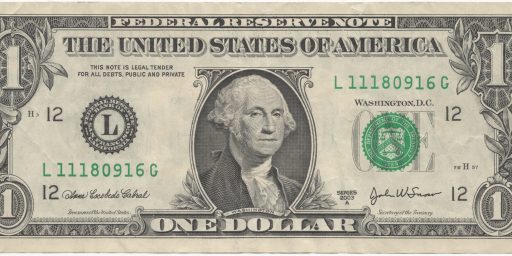No New Taxes – Or Old Ones, For That Matter
 Megan McArdle briefly discusses abolishing taxes altogether and having the federal government pay its way merely by printing money and taking measures to control inflation. (How state and local governments would meet obligations is unspecified.)
Megan McArdle briefly discusses abolishing taxes altogether and having the federal government pay its way merely by printing money and taking measures to control inflation. (How state and local governments would meet obligations is unspecified.)
It’s an intriguing idea beyond my amateur training in economics to rebut. My gut tells me this response from an anonymous comment is right, though:
The government is diverting real resources, so the cost will have to show up somewhere. Also, the dollar would be hit with another devaluation due to the fact that part of its value comes from its ability to cover tax obligations. If the government never actually bills anyone for taxes, dollars are less valuable.
Discuss.
Image via Blue Collar Republican via Google Images.





Sometimes people come up with ideas that are clever on a very limited level while simultanously being very, very stupid. This is one of those times.
Last time I checked, the government budget was nearly 10% of GDP. There’s no way around it: this plan is based on printing *enormous* amounts of money. Whether or not the banks try to reabsorb that money into huge reserves of currency doesn’t much matter: it’s still in the balance sheets. The result would be wild inflation. Starting large, and getting larger every year. There’s no magic math here: every dollar not collected in taxes is being newly created.
Not to mention that forcing banks to make a trillion dollars of purchases every year and then sit on them would bankrupt them very quickly.
It’s clever. But very dumb. You don’t need to be a brilliant economist to see this, unless I’m missin g something. Megan is very understative.
It’s more than that, glasnost. The federal government alone is almost exactly 20%.
DS,
I agree with you. And it is even more revealing to check out the last few years.
US Federal Budget
# 2008 – $2.9 trillion
# 2007 – $2.8 trillion
# 2006 – $2.6 trillion
# 2005 – $2.4 trillion
# 2004 – $2.2 trillion
# 2003 – $2.1 trillion
# 2002 – $2.0 trillion
# 2001 – $1.8 trillion
# 2000 – $1.8 trillion
# 1998 – $1.7 trillion
# 1997 – $1.6 trillion
# 1996 – $1.6 trillion
http://www.gpoaccess.gov
Figuring out more inventive ways to ruse the taxpayers for more of their wealth accomplishes little till we stop feeding the pigs in Washington.
Writer Megan must be a Ron Paul supporter!
The expansion of money is already a source of funds for the government. The federal reserve buys U.S. bonds, use a small portion of the interest for the the fed’s budget and essentially return the remaining interest (the particular accounting mechanism for this I don’t recall).
The only way you increase this as a source of funds is to print more money similar to Germany in the 1920’s.
This is probably one of the most honest posts by McMegan that I’ve ever seen. It pretty much reveals exactly everything about her economic philosophy and the practicality thereof.
To be fair to Megan, she titled this post “Craziest idea I have ever heard” and even demonstrates one (of many) way[s] that such a system would break down quickly.